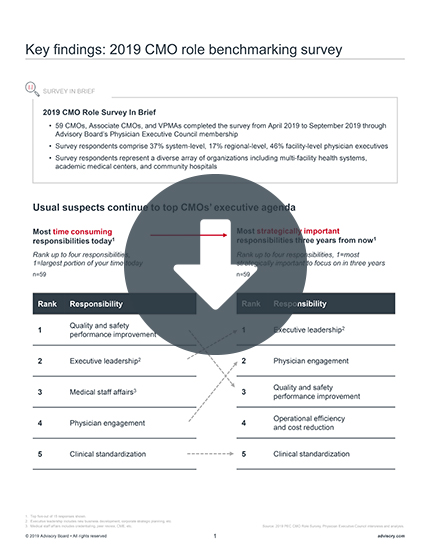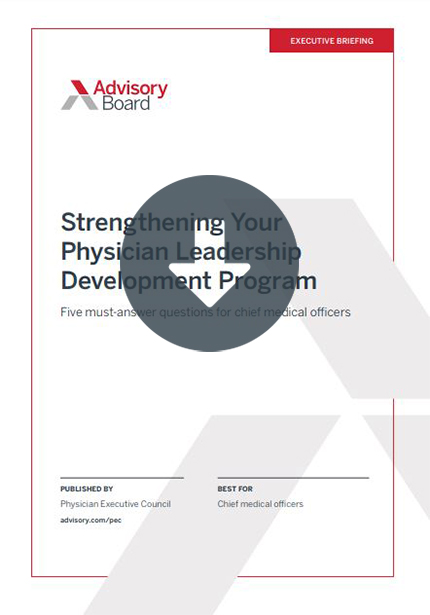Auto logout in seconds.
Continue LogoutWriting for STAT News, Salesforce CMO Ashwini Zenooz discusses how Covid-19 has revolutionized the CMO role. She says the job description for existing CMOs has been rewritten, sending companies "far outside of health care…scrambling to hire CMOs for the first time"—and this "shakeup" seems to be "more than just a passing fad."
Explore the key findings from our CMO benchmarking survey
Covid-19 'blew up' the CMO role
Reflecting on her own experience, Zenooz writes that until March 2020, her "job as chief medical officer of Salesforce was demanding but reasonably predictable," focused primarily on "steering the company's health care and life sciences strategy, identifying opportunities to bring solutions to market, and interpreting the significance of government policy changes for our clients and partners."
But "Covid-19 blew up [her] job description overnight," she writes. "Since the pandemic began, protecting the health, safety, and well-being of our global workforce has been the company's number one priority."
And according to Zenooz, her own experience is "anything but isolated." Covid-19 has thrust the CMO role into the spotlight for the first time, she writes, and the resulting changes—for companies inside and outside of the traditional health care industry—are poised to last.
Zenooz explains that while health care organizations and biotech companies have established CMO roles, the pandemic "has driven home the message that, in one sense or another, every company is now in the business of health."
For instance, Tyson Foods, which hired a physician, Claudia Coplein, as CMO "to oversee Covid-19 monitoring after outbreaks at the company's meatpacking plants…has since announced a partnership with Marathon Health to open health clinics near its facilities to foster an ongoing 'culture of health.'" Coplein previously worked as the CMO at MassMutual and has also worked as a flight surgeon in the U.S. Air Force.
But as CMOs are increasingly viewed as "business-critical to more and more companies," Zenooz asks, "what does this expanded CMO job description encompass?"
What does the new CMO role look like?
According to Zenooz, although companies have been responsible for employee health and wellness for years, Covid-19 "raised the stakes dramatically." Organizations had just days to "close offices and cancel work gatherings." And—even beyond keeping workplaces Covid-free—CMOs now "need to monitor and manage the mental health of workers as they experience unprecedented levels of anxiety and depression."
Further, Zenooz adds, "[i]n the absence of consistent messages from federal and local government, employers—and the [CMO] specifically—became reliable sources of truth for employees, interpreting and updating rapidly changing health and safety guidelines." In fact, according to Zenooz, several polls indicate that throughout the pandemic, "people's trust in employers has been much higher than in government officials."
And on top of all those responsibilities, "CMOs monitoring employee health at home and advising on the safe reopening of worksites must also factor in the impact of lost productivity." According to Zenooz, the 2017-2018 flu season resulted in an estimated $21 billion in lost productivity. Covid-19's final numbers "will be massively higher."
Moreover, for CMOs in retail and service industries, "maintaining the health and safety of customers is as important as protecting employees," Zenooz writes. Companies "have had to roll out, continuously update, and enforce customer policies around social distancing, hand-washing, and mask-wearing," she explains, with companies hiring or elevating CMOs "not only to lead these efforts but to signal a serious commitment to health and safety at the executive level."
For instance, Zenooz cites Royal Caribbean, a cruise ship company that recently hired Calvin Johnson as CMO "to implement and oversee an elaborate testing operation when the cruise line is cleared to sail again." Johnson previously served as CMO for Corizon Health, secretary of health of Pennsylvania, and medical director of the New York City Department of Health.
The pandemic has also "made clear that we are not only dependent on and beholden to our employees, customers, and shareholders," Zenooz adds, "but also to the countries and communities we operate in." In that regard, CMOs are being "increasingly charged with synthesizing a wide array of information and data sources to help guide organizational strategy, from phased reopening of offices to employee benefit and health and wellness offerings."
In Zenooz's own role, that responsibility has translated to "speaking regularly with thought leaders and epidemiology experts across the health care industry" so as to "help steer strategy and do all we can as corporate citizens to make things better, not worse, for the communities we operate in."
Amid the pandemic, Zenooz writes that no CMO's "pre-pandemic responsibilities" haven’t gone away. On the contrary, these responsibilities have in many cases "been elevated in importance and accelerated in urgency by the events of recent months." For example, she points to how the pandemic "has exposed fault lines and gaps in our infrastructure and support systems that demand our attention," such as "deeply entrenched disparities" that affect "low-income areas and communities of color…at a much higher rate than others."
"If the hiring and empowerment of [CMOs] at more kinds of organizations signals greater seriousness about protecting the health and well-being of employees, citizens, and communities, it can only be a positive trend for society," Zenooz writes. "The coronavirus pandemic has reminded us that we are each part of a larger social and biological organism, deeply connected and interdependent. Managing our collective health through and beyond this crisis is now all of our jobs" (Zenooz, STAT News, 3/30/20; Gangitano, The Hill, 12/16/20).

Every few years, the Physician Executive Council surveys its members to learn how CMOs from across the country prioritize their time today and how they expect their role to evolve in the future.
Explore our key findings and how these results have changed over time.
Don't miss out on the latest Advisory Board insights
Create your free account to access 1 resource, including the latest research and webinars.
Want access without creating an account?
You have 1 free members-only resource remaining this month.
1 free members-only resources remaining
1 free members-only resources remaining
You've reached your limit of free insights
Become a member to access all of Advisory Board's resources, events, and experts
Never miss out on the latest innovative health care content tailored to you.
Benefits include:
You've reached your limit of free insights
Become a member to access all of Advisory Board's resources, events, and experts
Never miss out on the latest innovative health care content tailored to you.
Benefits include:
This content is available through your Curated Research partnership with Advisory Board. Click on ‘view this resource’ to read the full piece
Email ask@advisory.com to learn more
Click on ‘Become a Member’ to learn about the benefits of a Full-Access partnership with Advisory Board
Never miss out on the latest innovative health care content tailored to you.
Benefits Include:
This is for members only. Learn more.
Click on ‘Become a Member’ to learn about the benefits of a Full-Access partnership with Advisory Board
Never miss out on the latest innovative health care content tailored to you.

